Quite the Pickle
3/2/2022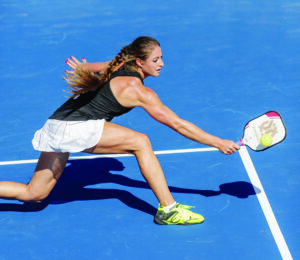
The sport of pickleball has caught fire in Des Moines and across the nation. Photo by Steve Taylor / USA Pickleball.
Do you enjoy playing tennis? How about ping-pong? Or badminton? If you checked all three boxes — or even if you didn’t — we have a sport or you: pickleball.
Played indoors or outdoors on courts less than half the size of a regulation tennis court, with paddles and a yellow plastic orb that resembles a Wiffle ball, pickleball is a sport literally for everyone. Yes, that means you, guy with two bad knees and a pot belly. All you need is a little hand/eye coordination, some patience, and the willingness to have some fun. On a pickleball court, no matter what level of player you are, there’s rarely a dill moment.
What it is
A pickleball court is 20 feet wide by 44 feet long. Much like the aforementioned games, a net slices the court into two halves. The net is hung at 36 inches high at each end and 34 inches high in the middle. On either side of the net, there’s a marked off zone, commonly called “the kitchen,” that extends 7 feet back.
The object of a pickleball match is to win the game by scoring more points than your opponent. Points can only be scored by the side that is serving. A point is scored when an opponent fails to return the ball, volleys in the non-volley zone, or hits the ball out of bounds.
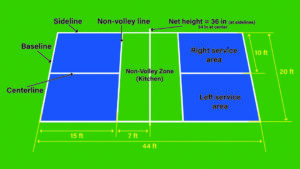 The first person or team to score 11 points and be leading by at least two is the winner. If a side reaches 11 points but is not two points ahead, the game continues until one team achieves the two-point margin.
The first person or team to score 11 points and be leading by at least two is the winner. If a side reaches 11 points but is not two points ahead, the game continues until one team achieves the two-point margin.
The game begins after a coin toss to decide which side serves first. The ball is served diagonally and underhand, with the paddle below the waist and both feet behind the back line. The serve must clear the net and land within the opposition’s playing area. The receiver of the ball must let the ball bounce before returning the serve, and then the server must also let the ball bounce before returning. This is known as the two-bounce rule. After the two bounces, players may volley the ball. No volleying is allowed in the “kitchen.” Volleys may be performed outside of this zone, and non-volleys can be hit within it.
Deep breath. This sounds like a lot, but it really isn’t once you get the hang of it.
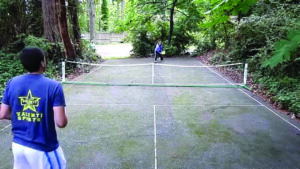
The first pickleball court, created in 1965 at Bainbridge Island, Washington, is still in existence.
Where did the pickling begin?
As legend has it, after playing a round of golf one Saturday during the summer of 1965, Congressman Joel Pritchard of Washington State and businessman Bill Bell returned to Pritchard’s home on Bainbridge Island, Washington, only to find their families sitting around, bored. Fortunately, the property came equipped with what had been an old badminton court. The problem was, there was no badminton equipment to be found anywhere, only two ping-pong paddles and a plastic ball. So they made do. And their own rules. They were on to something, even if it was their own little “thing.”
Initially, the net was left at badminton height (60 inches), but, as time went on, the players found that the ball bounced well enough on the asphalt that they could lower it to 36 inches. Another friend, Barney McCallum, was introduced to the game the following weekend. Soon, the three men wrote some “official” rules, keeping in mind the original purpose, which was to provide a game that the whole family could play together.
Joel’s wife, Joan Pritchard, began calling their game “pickle ball” — a reference to the thrown-together, leftover non-starters in the “pickle boat” of crew races. Many years later, as the sport grew, a controversy ensued when a few neighbors said they were there when Joan named the game after the family dog, “Pickles.” The Pritchard family, however, disagrees.
In 1967, the first permanent pickleball court was constructed in the backyard of Pritchard’s friend and neighbor, Bob O’Brian. Years later, in the spring of 1976, the first pickleball tournament in the world was held in Tukwila, Washington, at South Center Athletic Club.
The United States Amateur Pickleball Association (U.S.A.P.A.) was formed in 1984, and, with it came the first official rulebook. USA Pickleball membership has grown steadily ever since and is now at more than 53,000 members.
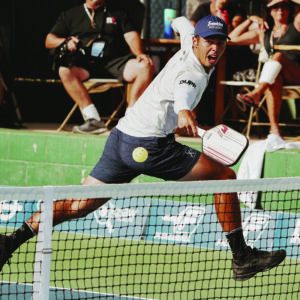
Ben Johns is the No. 1 ranked player in the world in pickleball. Photo courtesy of Steve Taylor / USA Pickleball
At the top
And, while the sport of pickleball has grown by leaps and bounds in recent years, the fact remains that a vast majority of people know nothing about it. To them, a pickle is still just something that comes on the side of a sandwich.
CITYVIEW is here to help change that. In doing so, we decided to go straight to the top. And when we say “the top,” we mean Ben Johns, the No. 1 ranked professional pickleball player in the world in singles, doubles and mixed doubles — the Michael Jordan of the pickleball world. And, instead of Air Jordans, Johns has his own custom signature line of paddles.
Pickleball was a perfect fit for the 22-year-old Maryland native. Johns first played the sport in 2016 at the age of 16. Incredibly enough, it wasn’t a case of love at first serve.
“Honestly, the first day, I didn’t fall in love with it like a lot of people did,” Johns said. “I’m pretty sure that it was my mom that I played it with first, so we got some wooden paddles from Dick’s Sporting Goods and a terrible plastic Whiffle ball and just hit it around. It was fun, but we didn’t know the rules. I thought it was like mini tennis but with no speed.”
A few places to playSmash Park
|
The paddles collected dust for a month before Johns picked one up again. It was then, in another friendly game — this time with his dad — that a real connection was made.
Within weeks, he was playing every day. This was his ticket, his “thing.”
Incredibly, a few months later, he took fifth place in Men’s Pro Singles Division at the U.S. Open Pickleball Championships. A star had been born, and his meteoric rise was only beginning.
The first two years were simply for the love of playing, he admits. He knew he was good and was having a great time doing it, but it wasn’t something he was thinking about full time. It wasn’t until 2019, when the game was becoming more popular nationwide, that Johns thought he could make a career out of it, he said.
“The sport was growing in every way by then, and then I got sponsored by Franklin Sports, which was a big signal for me,” he said. “The tournaments were getting bigger, the prize money had more than doubled since I had started, and there were more companies involved, spectators, and just more fans involved.”
At 22, Johns is one of the youngest players on the Professional Pickleball Association (PPA) tour but holds more Triple Crowns (winning gold medals in all three divisions) than any other male pickleball professional in the history of the sport.
As if being the best in the world isn’t enough on his already large plate, Johns is a soon-to-be-graduating senior at the University of Maryland, handling a full class schedule as well as two businesses and a podcast. But make no bones about it, pickleball is his bread and butter.
“Being the best in pickleball is my primary priority, because not too many people get a chance to be the best at anything,” he says.
As for this sport he loves, he encourages everyone to give it at least a shot.
“It doesn’t matter what your background is or what sport you play,” he said. “No matter what, you’re going to go out there and have fun and have rallies with anyone you play right away. Then you can take it where you want. You can be a recreational player, a tournament player, or just whatever you want.”
Never again
Back on planet Earth with the rest of the mere mortals is business owner and amateur pickleball competitor Robert Rodriguez.
Rodriguez, the owner of Boji Surf Company in Arnolds Park, is a self-proclaimed pickleball addict. In fact, he enjoys the game so much that there isn’t room for any other paddle-and-ball games in his life. As in zero.
“I like tennis, but I’ll never play it again,” Rodriguez said. “Pickleball is so much fun. And, if you’ve already played tennis, it’s easier to at least get decent at it pretty quick. We are so into it. I can’t believe how much fun it is.”
Rodriguez said pickleball is almost like playing a large game of ping-pong, with the game’s lightning-fast volleys and overall action.
The game, he contends, doesn’t match the stigma some attach to it.
“People who haven’t played say things like, ‘Oh, that’s the game my grandparents play down in Florida,’ ” he said. “But they don’t know. You get out there and play for two or three hours, and you’ll be sweating your butt off.”
It was over a beer at the bar one night two years ago when a friend of his introduced him to the game, mentioning to Rodriguez that some of the guys were getting together to have a game of pickleball at the local YMCA the next morning. Curious, Rodriguez showed up. Once he stepped foot onto the court and got into the flow of things, the hook was set almost instantaneously.
“It seems like I’ve been there almost every day since then,” he laughs.
After the initial introduction, Rodriguez began playing so frequently that he began to enter amateur tournaments around the area, playing with a partner in the doubles competition. The first one they entered, they won. Then they won again. And again. Now, he travels across Iowa; to Minneapolis, Minnesota; Sioux Falls, South Dakota; and Omaha, Nebraska, to compete. Next in his sights: Des Moines.
The numbers
|
Singles play is something he hasn’t delved into at this juncture, Rodriguez said. For him, doubles is where it’s at.
“I think it’s just more fun because there’s more action, and it’s fun to have someone there with you,” he says.
Rodriguez’s next challenge is simply to get better, he said. Making the step up to the next rung on the ladder can be difficult if you don’t have the right partner. Then there’s the possibility of entering some open tournaments, like the one held yearly in Las Vegas, Nevada.
“We’ll see,” he says. “The big thing now is just getting better and better so I can move up.”
His advice to those curious about the game?
“Just try it,” he said. “Don’t judge it by its name. Once you try it, you’ll be hooked, too.”
A game for everyone
Des Moines Metro Pickleball Club (DMMPC) President Chuck Golliher said, while the sport is unique in its rapid, fast-paced action, it’s also just a fun and safe game for players of all ages.
“The aspect of gathering together for play and camaraderie is special,” he said. “The type of play — recreational or competitive — can be organized in a dozen different ways, but the one constant is the welcoming, friendly, supportive attitude of our players. Inevitably, this environment leads to social networking and social events well beyond the game itself.”
Currently there are nearly 300 club members scheduling their matches via playtimescheduler.com, a free website that allows players to tell others when/where they are playing. More than 1,000 players are signed up on that website.
There are four outdoor, dedicated pickleball facilities in the metro with a total of 13 courts: Urbandale (4), Clive (4), Waukee (4) and Des Moines (1). West Des Moines is currently constructing eight dedicated courts that will be available late this year. Smash Park has two outdoor and four indoor courts. Demand has been so large, in fact, that additional Smash Park franchises are being built in Pella and other communities. The new MidAmerican Energy Company RecPlex has two dedicated courts plus three others that can be set up if demand warrants it.
There are a significant number of tennis courts that can be used with the addition of pickleball lines, Golliher said, but, in order to do so, the net from the tennis court must be adjusted in three places to make it workable.
“And you can’t hit an ‘ernie’ (shot around the net) since tennis nets are far wider than those used for pickleball,” he said. “Pickleball players do not like playing the game on lined tennis courts, but they do play there because there are so few dedicated courts.”
Growth in the number of players has been significant.
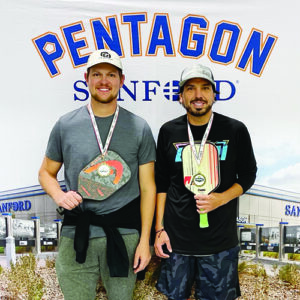
Robert Rodriguez (right) has been playing in — and winning — amateur tournaments around the Midwest since taking up the sport two years ago.
“Our beginner training class, which we do for free, is full every week, with others on the waiting list,” Golliher said. “As you can imagine, with only 13 dedicated courts and well over 1,000 players in the area, the pressure on court space is huge. And, the sport is now reaching all ages, from 8-80.”
While there isn’t currently a juniors program, Golliher said more young people are participating in the classes offered by park and recreation departments. For adults, it’s trickier due to the limited hours available after a normal work day, as well as lighting — or lack thereof — on some courts.
The sport draws players from all the counties that touch Polk County, and the DMMPC frequently serves as host for people passing through or visiting the area. They can find locations to play by looking up clubs, going to playtimescheduler or using a national database (Places2Play) to find courts.
If you’re the competitive type, Des Moines Park & Recreation currently holds two tournaments per year. The Northwest Rotary Club does one per year, and a number of informal tournaments are held by local communities (Urbandale, Mason City, Pella, DMMPC, etc.) and typically draw 150 or more players. Some of the local players are branching out to national tournaments as well, Golliher said.
Whether you’re an experienced player or an absolute beginner, the sport is a sweet one with positives that extend far beyond the court.
“Every community benefits from this type of engagement that brings people together with the simple promise of exercise, friendly competition and fun,” Golliher said. ♦


















